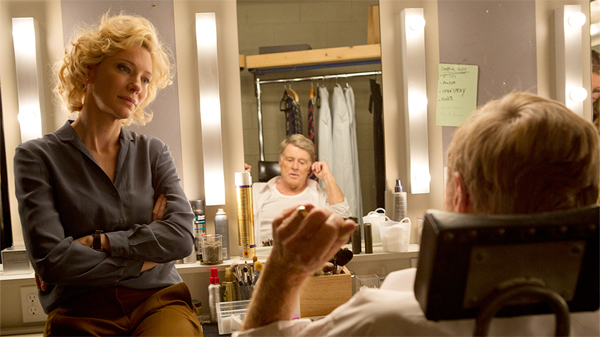Truth Review
Truth‘s biggest misstep might be its title. James Vanderbilt wrote and directed this absorbing journalism drama about the CBS News scandal that brought an end to Dan Rather’s time as the network’s lead anchor, and it’s about so, so many things, but I’m not sure truth is one of them. It’s an ideal that journalists should aspire to, and that’s at least part of what Vanderbilt wants to say. But a crackling Cate Blanchett monologue near the film’s conclusion more or less spells out Vanderbilt’s thesis, I think. To paraphrase: Our political biases are shrouding us from accepting evidence of wrongdoing that’s right in front of our faces, and that’s a damn shame.
That goes well beyond the Mary Mapes/Rather/Jerry Killian papers fiasco and even George W. Bush’s military service record, and it’s a message that resonated angrily and yes, truthfully, with me over the film’s two dynamic hours.
Contrary to what you might expect, the film’s focus isn’t Rather, but — um — rather Mary Mapes (Blanchett), a veteran 60 Minutes producer with an unyielding passion for doing journalism right. We meet her at least one Xanax and likely several glasses of wine into an introductory meeting with an attorney. How did she get here? That started six months earlier, in the spring of 2004.
In a pitch meeting with her superiors, Mapes suggests some time and resources to follow a thread about President George W. Bush’s military record that went cold (for fascinating reasons) in the run up to the 2000 election. Mapes suggests that there’s a compelling reason to believe the president went AWOL during his time serving as an airman in the Texas National Guard, a position he was appointed to because of his family’s political influence and so Bush could avoid going to Vietnam. She’s given some very damning documents by a Lt. Col. Bill Burkett (Stacy Keach) that appear to support her hypothesis, which is corroborated by other witnesses and much of what was available from Bush’s public records.
After airing the piece in September — two months before the election — the documents come under fire as possible forgeries. CBS used four document examiners to confirm the authenticity of the documents, but as they were copies, verifiable truth was more or less impossible. Still, two of the four said without reservation that they were the real deal, while the other two had some doubts but were happy to defer to their more confident colleagues. Mapes and her team spend the next few weeks combing over superscripts, kerning, and other anachronistic, typing-related minutiae to try to defend the accuracy of the rest of their reporting, which is rock-solid. When Burkett comes out and admits to lying about how he came to possess the documents, however, it’s game over.
“Classical” is the best way to describe the film’s mechanics and arc, but I use the term respectfully, not derisively, thanks to Cate Blanchett’s utter command over every single scene of the film. I already knew she was the best actress of her generation, so her work in Truth is merely another strong performance to hang her hat on, but the role of Mary Mapes would be the lifetime best for most others. Early on, when things are going well for her, Blanchett lays the groundwork as a still-standing-but-only-barely woman worn down by the stress of an impossibly demanding job. When things go haywire, she’s a wreck, but her emotion comes from a place we understand. Vanderbilt’s screenplay does a great job at defining the character’s motivations, so when she needs to get on the phone with her father to ask him to stop talking to the press, we know why there’s so much pain.
A lot will be said of Redford’s Rather portrayal because of the high profiles of both men, but I found him merely passable in a surprisingly underwritten role. There’s nothing wrong with his take on the legendary newsman per se, but he’s the film’s least interesting character, used primarily for speechifying and exposition. When he’s given a grand send off following his final news broadcast, you wonder why the film “goes there” in such a big way for a character who’s oddly passive.
But that’s my only major quibble, and it’s not one that detracted much from the final product. I was impressed by the film’s cinematographer, Mandy Walker, who employs a few simple but long takes during key interviews. This allows the actors to do their thing, while the camera very slowly zooms in on the star of the scene — magnifying the scene’s intensity, and really conveying the stakes of every conversation. Walker also shot Baz Luhrmann’s Australia and belongs in the conversation of best female cinematographers working today.
The writing, too, is really strong. That’s Vanderbilt’s calling card, having cut his teeth on David Fincher’s crime masterpiece Zodiac, as well as several recent major studio films — The Amazing Spider-Man, White House Down. Truth is, in fact, his directorial debut, and while his screenplay stands out more than his direction — for its uncanny ability to throw a lot of information at you without ever feeling too dense or too dumb — he’s a filmmaker I’ll have my eye on going forward.
Ultimately, though, it’s both Blanchett and the film’s myriad bigger-picture themes that will stick with me. The actress is on another level — again — and I loved the way the film rises above the he-said-she-said, is-it-true-or-isn’t-it hot potato of a question at its core to be about something bigger than Rather-gate. I think the world has moved beyond the questions about GWB’s military record, but questions about the reverse-symbiotic relationships between news organizations and their parent companies, the politicization of facts, and the protracted death of the old guard of the fourth estate make this film both timely and rather timeless.
















